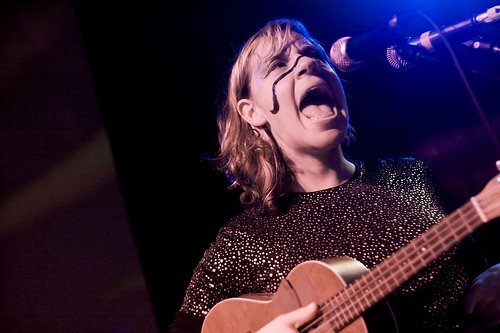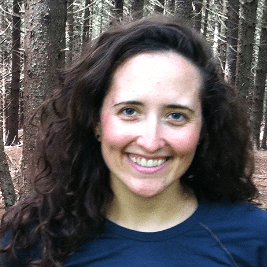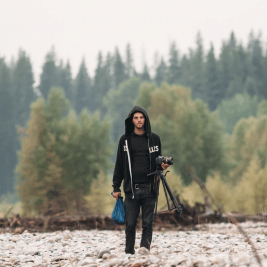
Merrill Garbus—the one woman powerhouse behind tUnEyArDs–spent the last month preparing for her sold out Sounds Like Brooklyn show this weekend, a European tour this month, and an upcoming spring tour with experimental band, Xiu Xiu. She’s a human tuner whose vocal fretwork of soulful howls has the spontaneous tenets of imaginative artists like Kaki King, Jamie Lidell, and Animal Collective. The Oakland-based performer discusses how she feels about being the industry’s current D.I.Y star, what she intends to do with her music muscle, and why her voice is the instrument she plays best.
oM: Can you describe the moment when you realized that tUnEyArDs was a sound people were appreciating?
MG: There were a couple of moments, beginning with when I made my initial recording. The first song I heard in me and worked on was “When You Tell The Lions.” I never heard anything like it before, but I had an inkling others would want to hear it too. I was so intrigued by its sound; it carried me through for a while. And I studied theater in school so the stronger part of my performance is what I do live. I had a lot of support from my friends doing open mics and playing for others. I remember playing Casa del Popolo and it was filled. I did Hatari; the crowd cheered and for me like it was the freakin’ Super Bowl. I was like ‘oh my god, they like it as much as I do.’ That moment is one I’ll remember forever.
oM: You’re being hailed as the one woman powerhouse. Do you embrace the term and what do you intend to do with the power?
MG: Yes, I do embrace the term. Any moment where it’s possible to show women a powerful woman figure is great. I take a lot of pride in being described in that way because I spent a lot of years as a self-hating, deprecating and passive woman. In terms of what to do with the power, I’m at the moment where I’m still wondering. I still feel like a struggling artist and this all could go away very fast. It’s imperative that I use the power I have in my career to help those who don’t have the power. . .like sharing my resources with musicians in South Africa who don’t have any. This power is not for me to be a rock star who’s inaccessible, but an artist who’s aware and connected.
oM: Since your sound is a composite of so many influences and instruments, how do you feel when your music is labeled to a specific category?
MG: To be put in a category can feel like someone is oversimplifying your entire existence. But, I feel that boxes and categorizing is something that the brain needs. So, if someone says I’m experimental hip-hop, I say, ‘Well, what about this song that sounds like a folk ballad?’ To be categorized by people is fine as long as I don’t have to abide by it. My category for me is me. Whatever comes out of me is a whole bunch of stuff.
oM: Although you play a lot of instruments, your primary instrument is your own voice. How did you find it?
MG: You’re right, it is. My voice has followed the trajectory of me finding myself. As cheesy as that sounds it’s the truth. As I got more comfortable as a human being, I became more comfortable with my voice and it can be a lot of instruments. I am intent on never being one thing because I’m not one thing. If one’s sound is viscerally rooted in the heart and soul and it’s the sound coming out of you, then imagine how many different feelings we have in one day. Shouldn’t a voice have the same?
oM: You’ve said in previous interviews that you like to create a “pause moment” when you’re on stage. How do you get to the point of creating when you’re performing?
MG: It takes a lot of rehearsal. The performance is always based upon what’s happening at the moment. Nate (bassist) and I come from a background of improvisation—I was part of an all-girls improve comedy group at Smith college. We come in with a set for a show and play it. But the character of the songs and what happens in them and in between them is totally up for grabs. “Hatari” is a song that I’ve played for so long; I can go anywhere with it and it’s different every time I play it. For me that’s one of the most enjoyable parts: the music is constantly evolving and changing.
The debut CD, BiRd-BrAiNs and two previously unreleased bonus tracks, is available through 4AD.
Photo: Courtesy Flickr









 Sarah Knapp is a Brooklyn based entrepreneur whose love for the outdoors and community building led her to the October 2013 creation of OutdoorFest. She has a BA in History, is a Wilderness First Responder and a NY state hiking, camp and boating guide. Her proudest achievement to date is reading the Aeneid in Latin.
Sarah Knapp is a Brooklyn based entrepreneur whose love for the outdoors and community building led her to the October 2013 creation of OutdoorFest. She has a BA in History, is a Wilderness First Responder and a NY state hiking, camp and boating guide. Her proudest achievement to date is reading the Aeneid in Latin.  Allison was one of our first top writers and Chief Editor but is no longer working with offMetro. Allison is a native New Yorker, who has lived in Rome, Tuscany, Melbourne, Toronto and Los Angeles. She frequently contributed travel pieces to Family Travel Forum, using her own children as guinea pigs as they travel the globe. She never missed a chance to sample local delicacies, as her love for travel goes hand-in-hand with her love for food and wine.
Allison was one of our first top writers and Chief Editor but is no longer working with offMetro. Allison is a native New Yorker, who has lived in Rome, Tuscany, Melbourne, Toronto and Los Angeles. She frequently contributed travel pieces to Family Travel Forum, using her own children as guinea pigs as they travel the globe. She never missed a chance to sample local delicacies, as her love for travel goes hand-in-hand with her love for food and wine.  Josh Laskin is a freelance travel writer and photographer based in the White Mountains of New Hampshire. When he is not at work or on the road, you can find him in the mountains snowboarding, climbing, hiking, fly fishing, mountain biking, and eating bagel bites.
Josh Laskin is a freelance travel writer and photographer based in the White Mountains of New Hampshire. When he is not at work or on the road, you can find him in the mountains snowboarding, climbing, hiking, fly fishing, mountain biking, and eating bagel bites. Annie is a travel writer, environmentalist, and surfer based in Venice, CA. She heads up our West Coast team, keeps our grammatical errors in check, and makes sure our California writers always have a plan for their next adventure. Follow Annie’s travels @annelisemcb.
Annie is a travel writer, environmentalist, and surfer based in Venice, CA. She heads up our West Coast team, keeps our grammatical errors in check, and makes sure our California writers always have a plan for their next adventure. Follow Annie’s travels @annelisemcb. Carly Pifer is a freelance writer who has been known to follow whims inspired by romantic movie scenes or colorful street style shots to India, Japan, Tunisia and Argentina. After stints living in Seoul, Boston, Paris and Los Angeles, writing and searching for something intangible, she landed somewhat steadily in Brooklyn and has begun to find inspiration in her more immediate surroundings.
Carly Pifer is a freelance writer who has been known to follow whims inspired by romantic movie scenes or colorful street style shots to India, Japan, Tunisia and Argentina. After stints living in Seoul, Boston, Paris and Los Angeles, writing and searching for something intangible, she landed somewhat steadily in Brooklyn and has begun to find inspiration in her more immediate surroundings.  Kate E. O’Hara is a New York based freelance writer and photographer who loves all things food—especially the people who make it and market it. Her writing aims to capture the essence of the food experience; the stories that go well beyond a plate of ingredients. In addition to her love of food, Kate is also known to have a hankering for red wine and craft beer. You can also find Kate on Instagram
Kate E. O’Hara is a New York based freelance writer and photographer who loves all things food—especially the people who make it and market it. Her writing aims to capture the essence of the food experience; the stories that go well beyond a plate of ingredients. In addition to her love of food, Kate is also known to have a hankering for red wine and craft beer. You can also find Kate on Instagram